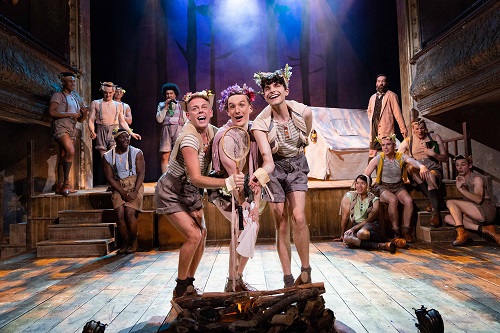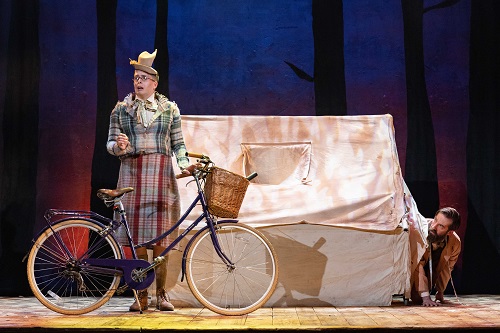 United Kingdom Gilbert and Sullivan, The Mikado: Wilton’s Music Hall, London, 19.6.2023. (CS)
United Kingdom Gilbert and Sullivan, The Mikado: Wilton’s Music Hall, London, 19.6.2023. (CS)

Production:
Director – Sasha Regan
Musical Director/Pianist – Anto Buckley
Choreographer – Adam Haigh
Designer – Ryan Dawson Laight
Cast:
Declan Egan – Bertie Hugh
Sam Kipling – Miss Violet Plumb
Lewis Kennedy – The Mikado
David McKechnie – Mr Cocoa
George Dawes – Wilfred Lush
Aidan Nightingale – Albert Barr
Owen Clayton – Bluebell Tring
Richard Russell Edwards – Hebe Flo
Christopher Hewitt – Kitty Shaw
Ensemble – Harry Cooper-Millar, Oliver Bradley-Taylor, Patrick Cook, Struan Davidson, Francisco Gomes, Elliot Akeister, Shane Antony-Whitely
‘Pooh Bah, it will be remembered, traced his ancestry back to a “protoplasmaI primordial atomic globule”; consequently, no Japanese gentleman of rank, however sensitive, could imagine himself or his progenitors to have been made the subject of the English author’s satire.’ So wrote François Cellier – who was musical director and conductor of the D’Oyly Carte Opera Company during the original runs and early revivals of the Savoy operas, including nine Gilbert and Sullivan operas – in his 1914 book, Gilbert and Sullivan and Their Operas.
In her book, The Japan of Pure Invention: Gilbert and Sullivan’s ‘The Mikado’, Josephine Lee argues that The Mikado’s racial mimicry is ‘seemingly without the malice or virulence’ that so often accompanies other fantasies of the Orient. The racial stereotypes are picturesque rather than poisonous. And, one would have to agree that as a ‘portrait’ of Japan, Titipu is evidently and intentionally nonsensical. The Mikado, for all its Japonaiserie is a domestic satire; it’s the British Establishment – and the sadism of the class system and the institutions which uphold it – that is really Gilbert’s target.
Yet, Gilbert and Sullivan’s The Mikado was censored in the early twentieth century in both London and Japan because of its portrayal of the Emperor. After World War II, though, it became one of the most revived Western shows in Japan. The opera’s representation of ‘race’ is clearly complex. Lee asks three central questions. First, how should the opera be presented and received in the modern-day world of wokeness (I use the word positively)? Second, should the opera be boycotted for its reductive, Orientalized vision of Japan? And, lastly, should it simply be commemorated for its legacy to the comic opera tradition?
Sasha Regan’s answer to the final question is a resounding ‘yes!’ Her all-male Mikado, first seen in 2017 and now revived at Wilton’s Music Hall at the start of a four-venue tour, is joyous, warm and sincere. Regan ditches all oriental allusions. Instead, we venture into the woods and join a 1950s public school camping trip which conjures the spirit of Enid Blyton, in all its innocence and ambiguity. Designer Ryan Dawson Laight gives us just a swivelling tent against a Midsummer Night’s Dream back-drop of Titipu trees, magically lit by Alistair Lindsay – all shifting shapes and shadows.
In this Anglicised tale, Nanki-Poo becomes Bertie Hugh, the son of the Mikado who has fled from imminent matrimony to Kitty Shaw (Gilbert’s Katisha) and is somewhat ineptly pursuing Miss Violet Plumb (Yum-Yum), who is herself betrothed to Mr Cocoa (The High Executioner, Ko-Ko), the master-in-charge of the scouting venture. Mr Cocoa has his own worries: he’s been condemned to death for flirting and must work out how to behead himself (with a cricket bat) and his entire staff have resigned in protest at his appointment, leaving Albert Barr (Pooh-Bah) running the show.

Scouts’ shorts and knitted tank tops; cricket bats and badminton rackets; bicycles (and a pump, employed somewhat vigorously by Kitty) and campfires; heads and legs poking through tent flaps; ‘ladies’ indulging in a (slightly too) sensuous pre-wedding makeover-massage: the choreography (Adam Haigh) and design are both brilliantly inventive and a bit hyperactive. But, Regan just about avoids Carry on Camping. And, she cleverly exploits the metatheatrical awareness of Gilbert’s libretto: so, the restless lads don’t settle down to sleep but instead discover a dressing-up box and re-enact an ancient tale …
Declan Egan’s Bertie is wonderfully open-hearted: a bit bewildered, sweetly charming, and rich and warm of voice. The object of his desire Miss Violet Plumb is superbly incarnated by Sam Kipling. As always in Regan’s all-male shows, the men sing the female parts in falsetto: Kipling may not be Iestyn Davies but he’d give many a countertenor currently on the opera circuit a run for their money. ‘Were you not to Mr Cocoa plighted’ is a highlight. Kipling is joined by Owen Clayton’s Bluebell Tring – a deliciously quaint portrait of Shakespearean tongue-in-cheek – and Richard Russell Edwards’ Hebe Flo. The pair’s on-going conflict is both bitterly felt and breezily delivered.
Aidan Nightingale is an engaging Albert Barr, cheery and chirpy despite his many chores, while Christopher Hewitt’s Kitty Shaw recalls the outrageous indignation of Wilde’s Miss Prism while still inspiring our tender sympathy. A veteran in the role, as the High Executioner David McKechnie’s comic timing and nuance are brilliant idiomatic. His ‘little lis’t lampoons modern opera with a deadpan irony that put me in mind of John Savournin’s G&S masterclasses. As the Mikado, Lewis Kennedy knows how to play the audience, as, in fact, do the whole company.
Perhaps the star of the show is musical director Anto Buckley who tickles the ivories with magisterial ease. Across the board, musical standards – and dramatic ones – are consistently high.
There’s something about Regan’s transposition which doesn’t quite seem right, though. In July 1992, a correspondent to the Musical Times, referring to Jonathan Miller’s long-running ENO production, which updated the action to a swish hotel in the 1920s wrote, ‘It is a commonplace among Savoyards that The Mikado is about England, not Japan: the joke was that what seemed utterly remote from the audience was in fact all about themselves. But if you actually change the location of the opera to England, as Dr Miller did, then you not only make the joke too obvious: you actually destroy it. The Mikado becomes an opera about England which is actually – surprise, surprise – about England. Where’s the fun in that?’
Well, there’s plenty of fun in Regan’s production, and, despite the inevitable campery, it’s fun of a fresh and innocent sort. One might just wish that the satire was a bit sharper.
The Mikado plays at Wilton’s Music Hall until 1 July, and then tours to Theatre Royal Winchester (3-8 July), Theatre Royal Bath (10-15 July) and Hall for Cornwall (20-22 July).
Claire Seymour